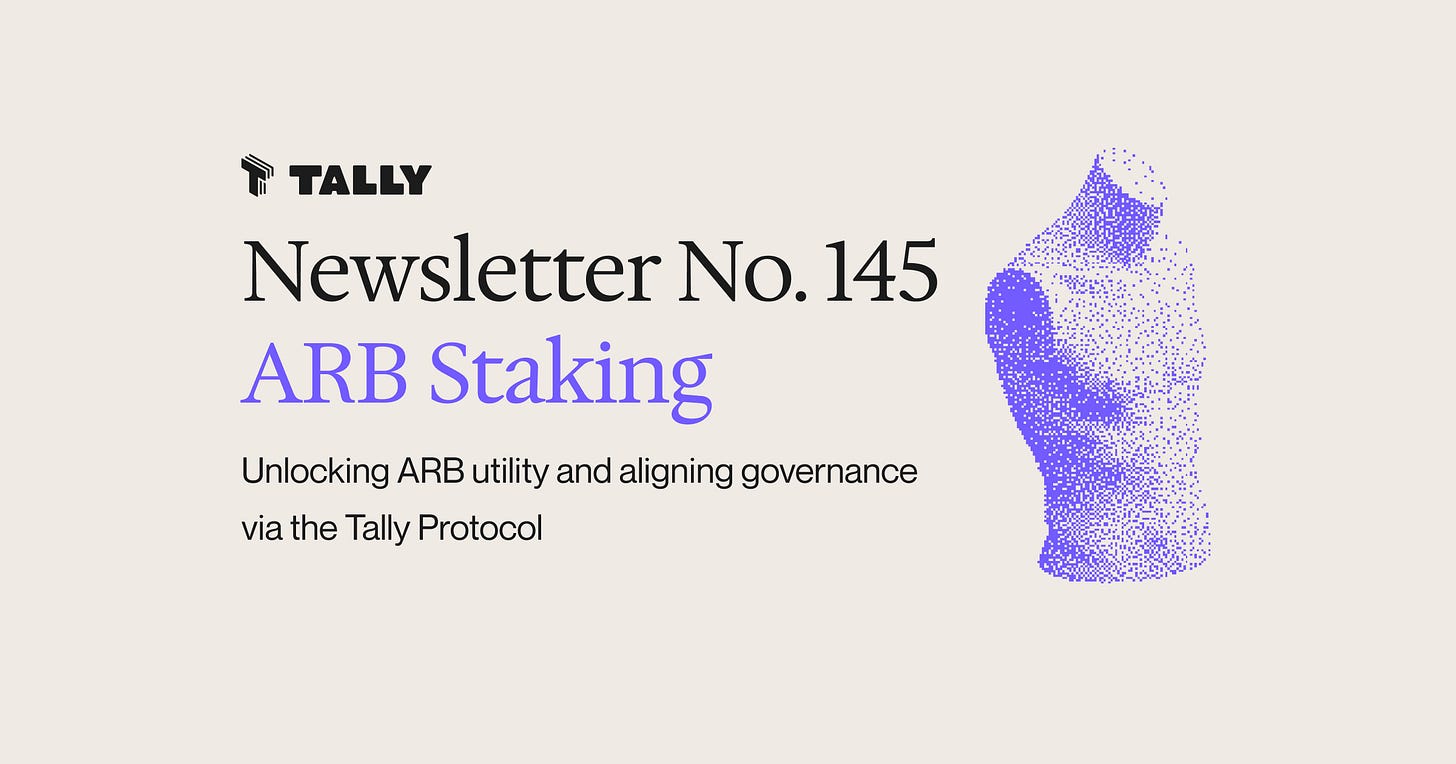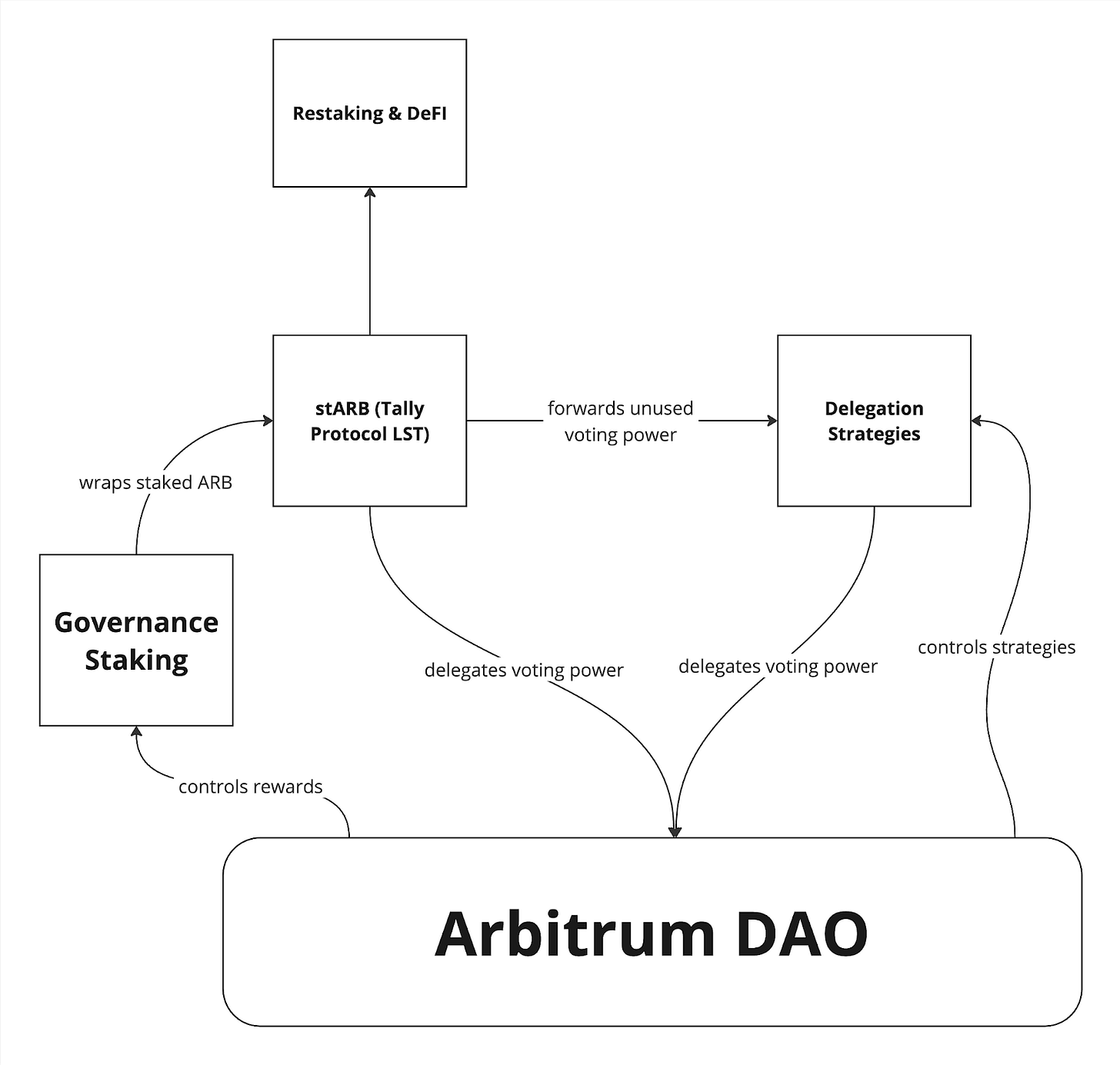ARB Staking
Unlocking ARB utility and aligning governance via the Tally Protocol
Welcome back to the Tally newsletter, your weekly source for DAO governance insights in the Tally ecosystem. This week we’re talking ARB Staking.
✦ ARB Staking
On Tuesday August 20th, Tally CRO and Arbitrum delegate Frisson, created an Arbitrum proposal to fund the implementation of ARB staking to unlock ARB utility and align Arbitrum DAO governance. On Monday September 9th, the proposal passed with 134.45M votes for, 4.5M votes against, and 7.42M vote abstentions. (The abstained votes are primarily from Frisson himself in the true spirit of credible neutrality.)
The passing proposal is the first step forward for the recently announced Tally Protocol which implements staking for governance tokens. The Tally Protocol improves governance participation and token utility by offering a liquid staked governance token (in this case stARB) which enables token holders to participate in DeFi and restaking while simultaneously maintaining the underlying governance rights of the token in the DAO.
If you’re interested in learning more about the Tally Protocol, check out the full announcement and whitepaper.
✦ AN OVERVIEW
The primary reason for implementing governance staking is to improve security and prevent the likelihood of an attack. Today, even the largest and most successful DAOs are at risk. Some recent examples include the Aragon Association unilaterally seizing funds from the DAO’s treasury without the support of the community (source) and a Nouns DAO fork losing half its treasury in 3 days (source).
“It is becoming economically attractive for a malicious actor to launch a governance attack on the DAO treasury. The potential profit of attacking the DAO treasury is increasing as more ETH accumulates in the treasury, while the cost of attacking the DAO through purchasing ARB for its voting power is not increasing proportionally to defend against attacks. A more developed version of this dynamic exists in the ENS and Compound DAOs, both of which are actively fighting off governance attacks (ENS documented here).”
The implementation of governance staking aims to improve the sustainability of the DAO by increasing voter participation and token utility.
“ARB Staking unlocks utility and aligns governance by creating a mechanism to stream future rewards from DAO-generated sources like sequencer fees, MEV fees, validator fees, token inflation, and treasury diversification to token holders who are delegated to an active governance participant. ARB Staking makes ARB usable in restaking and DeFi by returning voting power locked in contracts to the DAO.”
In addition to providing token utility via governance staking the proposal also states that a working group will be created to enhance governance participation through voting power redistribution and delegation strategies.
For stARB token holders that choose not to delegate their voting power, the protocol returns undelegated voting power to the DAO for redistribution to active delegates. Tokens that are locked in DeFi or restaking services automatically return their voting power to the DAO.
The ARB Staking & Delegation working group will focus on how to define an active contributor to the Arbitrum DAO, delegate incentives, and voting power distribution. It will collaborate with Tally and Karma to develop recommendations on Karma Score formula, the minimum Karma Score required to be eligible for staking.
The working groups will be formed via an open call for contributors that will be posted after this proposal passes the temp check stage. Each working group will deliver their recommendations in October, so that the recommendations can be turned into DAO proposals and created following the implementation of ARB Staking.
The following diagram illustrates ARB Staking via the Tally protocol:
For a full overview of technical specifications and implementation steps please read the full proposal here.
☻ DAO TALK
❉ ONCHAIN PROPOSALS
Gitcoin:
We’re asking for 31.25k GTC /mo for a 4-year engagement (1.5M GTC total) with Wonderland to Build Allo Protocol.




